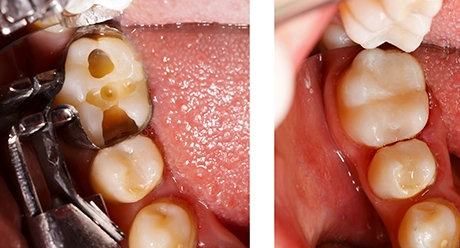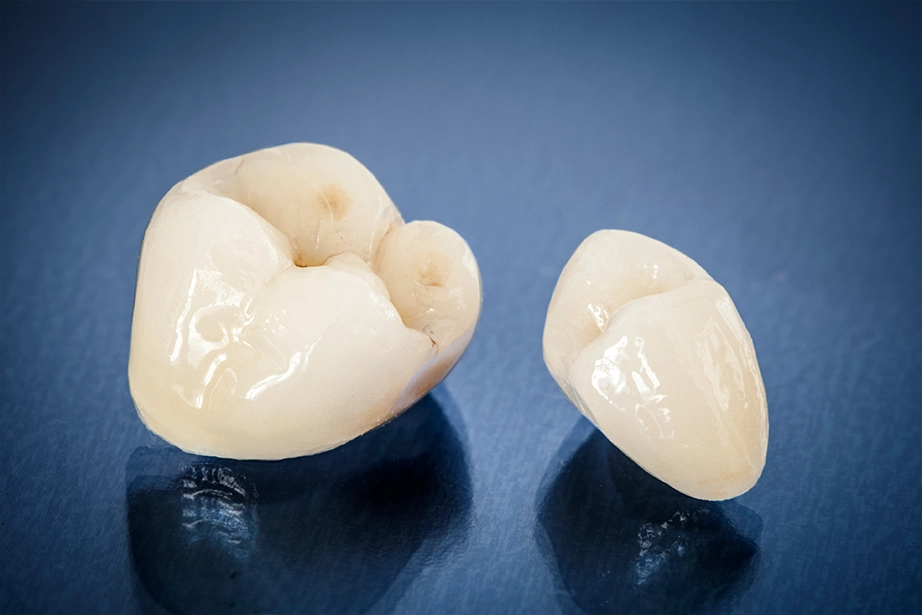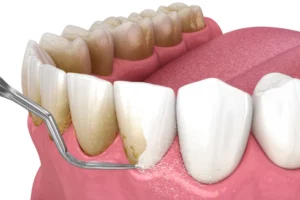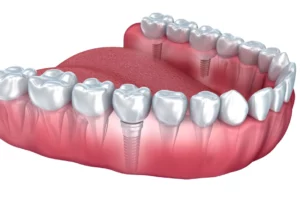What is a Dental Crown?
Missing teeth impacts your ability to eat, affects your sinuses, increases your risk of developing dementia, and changes the shape of your jaw and face. The good news is, if addressed early, you may be able to salvage damaged or decayed teeth with a dental crown.
A dental crown is a dental restoration designed to fit on top of a damaged or decayed tooth to protect and reinforce it. Dental crowns may be made of metal, porcelain, acrylic, or porcelain-fused-to-metal. A crown may also be used as a support for a dental bridge or as a prosthetic tooth with a dental implant.

Dental Crown Process
Typically, two visits are required for dental crowns. In some cases, a crown may be fabricated in the office.
During the first visit, the dentist will create a mold of the affected tooth. Then, some of the enamel will be removed to create space for the crown to sit. If needed, the dentist will perform root canal treatment or treat a cavity to prepare the tooth for the crown. In most cases, it takes 2 to 3 weeks for the dental lab to fabricate the permanent crown. The dentist will place a temporary crown on the tooth to protect it during this time.
When the permanent crown is ready, you will return to the clinic. The dentist will remove the temporary crown, clean the tooth thoroughly, and cement the permanent crown in place.
Advantages and Disadvantages of Dental Crowns
When considering any dental procedure, it’s important to weigh the advantages and disadvantages.
Some of the advantages of getting a dental crown include:
- Protects tooth from additional damages for up to 20 years
- Salvages the natural tooth
The disadvantages of getting a dental crown include:
- Will need repair or replacement after about 5 to 20 years
- Not covered by insurance if not medically necessary
- Prep procedures may increase sensitivity
What is the Average Cost of Dental Crowns?
There are several factors that impact the cost of dental crowns. The primary factor is the material that the crown is made of. The four primary options are:
- Porcelain
- Zirconia
- Metal
- Porcelain-fused-to-metal
Cost of Porcelain Dental Crowns
Porcelain is the most natural-looking option. This means that it’s also among the most expensive. Porcelain crowns range from around $1,000 to $2,500, with an average of around $1,300. This is the most common option for front teeth.
Cost of Zirconia Dental Crowns
Zirconia is a type of ceramic. However, it causes less wear and tear on neighboring teeth and is stronger and more durable than other ceramics. Since it is stronger, it is often used on molars. The cost is about the same as porcelain.
Cost of Metal Crowns
There are several different types of metal crowns available: nickel-chromium, nickel-titanium, or cobalt-chromium. Metal crowns are stronger, so they are often placed on molars. The cost of metal crowns ranges from around $900 to $2,500, with an average of around $1,300.
Porcelain-fused-to-metal Crowns Cost
For patients who want a strong, natural-looking crown, dentists often recommend porcelain-fused-to-metal. These crowns can be used anywhere in the mouth. However, the biggest disadvantage to these crowns is that the metal often shows through as a black line along the gum line. The cost of porcelain-fused-to-metal ranges from around $800 to $2,400, with an average of $1,100.
Cost for a Temporary Crown
Most dentists recommend that you protect the affected tooth between the first treatment and the placement of the permanent crown. Typically, this is done with a temporary crown, which is usually made of stainless steel. The cost of a temporary crown ranges between $200 to $700, with an average of around $450.
How Long Do Dental Crowns Last?
The life expectancy of a dental crown ranges from around 5 to 20 years. This depends on the material of the crown, as well as:
- Oral hygiene habits: brushing, flossing, and visiting the dentist every 6 months
- Lifestyle habits: smoking, chewing on non-food items such as pens, biting fingernails, using teeth as tools
- Other habits: clenching and grinding teeth
The better care and maintenance you give your crowns, the longer they will last.
Does Insurance Cover the Cost for a Dental Crown?
This decision is a personal one and depends a lot on how much you are spending. If you have dental insurance, chances are that it will cover up to 50% of the cost if the procedure is deemed medically necessary.
Medically necessary reasons include:
- Repairing cracked/damaged tooth
- Reinforcing tooth following root canal therapy
- Filling/stabilizing a significantly decayed tooth
- Replacing a missing tooth
However, most insurance providers will not cover this procedure for patients who simply want to improve the appearance of their teeth. In this case, it is classified as cosmetic and therefore elective.
Schedule Your Dental Crown Consultation Today!
If you have a severely damaged or decayed tooth, you may want to consider getting a dental crown. Schedule your consultation with the team at Smile Boutique Group. We have 3 convenient locations across California in Beverly Hills, Northridge, and Thousand Oaks, CA. Our team is highly trained and experienced in a variety of dental services for the entire family.




